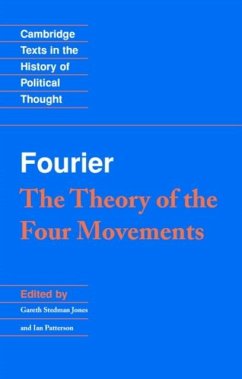This remarkable book, written soon after the French Revolution, has traditionally been considered one of the founding documents in the history of socialism. It introduces the best-known and most extraordinary utopia written in the last two centuries. Charles Fourier was among the first to formulate a right to a minimum standard of life. His radical approach involved a systematic critique of work, marriage and patriarchy, together with a parallel right to a sexual minimum. He also proposed a comprehensive alternative to the Christian religion. Finally, through the medium of a bizarre and extraordinary cosmology, Fourier argued that the poor state of the planet is the result of the evil practices of civilisation. Translated into English, this classic text will be of particular interest to students and scholars of the history of sexuality and feminism, political thought and socialism.
Dieser Download kann aus rechtlichen Gründen nur mit Rechnungsadresse in A, B, BG, CY, CZ, D, DK, EW, E, FIN, F, GR, HR, H, IRL, I, LT, L, LR, M, NL, PL, P, R, S, SLO, SK ausgeliefert werden.

